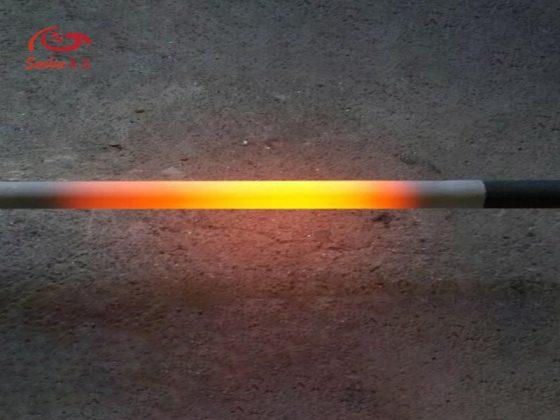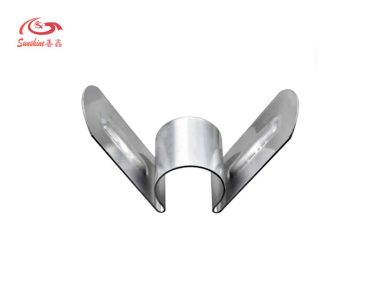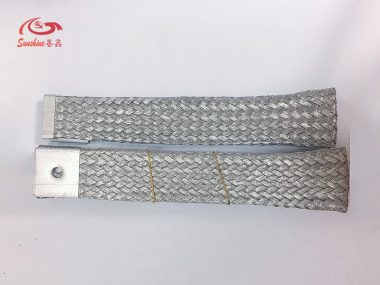Why B coating silicon carbide heating elements?
B coating in N2 atmosphere can enhance the antioxidant effect of the heating element.
Though the element will be oxidized very slowly in course of application,it also will make the resistance increased following long time application, this phenomenon calls aging.

In order to lower the aging speed and extend the service life of heater in different atmospheres, we use special technology to coat a protect film ont eh surface of heating element in the course of production.
B coating silicon carbide heating elements can effectively block water vapor, nitrogen, hydrogen, alkaline gas, metal oxide and other harmful gas volatiles, and effectively reduce the erosion of harmful gas volatiles on silicon carbon rods.
| Appearance | White, without luster. |
| Flexure strength | 50MPa |
| Porosity | 23% |
| Heat conductivity (hot end) | 12-18W/m+℃ at 1000℃ |
| Specific heat | 1.0 kj/kg+℃ at 25℃-1300℃ |
| Specific resistance (hot end) | 0.08Ω cm at 1000℃ |
| The coefficient of thermal expansion | 4.5X10-6 |
| SiC Content | above 99% |
| Material | Silicon carbide, Silicon Carbide (SiC) |
| Working temperature | Up to 1450 |
| Volume density | 2.6-2.8g/cm3 |
| Application | Industrial Heating Parts |
| After-sales Service Provided | Overseas service center available |
| Brand Name | SUNSHINE |
Coatings commonly used in heating elements
The coatings mainly include A Coating, B Coating, D Coating,which can enhance the Antioxidant property of element evidently and lengthen the service life.Since different coatings have different effects in different atmospheres, it’s necessary to choose the best coating against the specific problem.

B (Nitrogen) Coating Silicon carbide heating elements
Coating type: B
Appearance
White, without luster.
Application
Always used in N2 atmosphere, when temperature exceeds 1400℃, N2 will react with SiC and generate silicon nitride, which will cause heater fragile and service life shortened.
This coating is a layer of nitride formed on surface of heating elements by 1300℃ temperature, which will protect the heater body and prolong the service life of it.
| Atmosphere | Effect | Solution | RecommendCoat |
| Vapor and Moisture | Service life shortened 20% than in dry air | New furnace or old furnaces not work long time, to dry at low temperature completely and then heat up | A coating (anti-oxidation and waterproof coating) |
| Nitrogen gas | Above 1400℃, nitrogen will react with SiC to form silicon nitride, elements will become fragile and service life shortened. The effect by dew point is same as H2 | The recommended furnace temperature not higher than 1300℃, surface loading as low as possible | B coat |
| Hydrogen | The mechanical strength decreasing when elements temperature exceeds 1350℃, and also service life much depends on intensity of moisture. | Operation temperature lower than 1300℃, surface loading less than 5W/ CM2 | |
| Ammonia | Same as hydrogen and nitrogen | Operation temperature lower than 1300℃, surface loading less than 5W/ CM2 | B coat |
| Disassociated gas(Mixture of N2,CO,CO2,H2,CH4) | Carbon black from decomposed hydrocarbon on elements surface will cause elements rod loose. | Introducing air into furnace frequently to burn up additional Carbon. At side of furnace design, keep enough space between elements to prevent short circuit. | |
| (S、S2) | Above 1300℃, surface of elements will be corroded and resistance increasing rapidly. | Keep elements temperature lower than 1300℃ | |
| Vacuum | SiO2 protect film will not be formed, SiC decomposed itself and service life shortened. | Using in pressure over 0.13Pa and furnace temperature under 1100℃ | |
| Others | Various substances from treated materials, such as Pb, Sb, alkali metal react with elements, which may shorten elements service life. | To get rid of these substances in advance, design gas outlet in furnace in order to decrease the effect. | D coat |
The advantage of B Coating Silicon carbide heating elements
Generally used in nitrogen atmosphere, when the temperature exceeds 1400℃, nitrogen reacts with silicon carbide to produce silicon nitride, so that the element becomes brittle and the service life is shortened.
B Coating Silicon carbide heating elements generate a layer of solid nitride on the surface of the element at the temperature of 1300℃, the layer will protect the rod,so B Coating Silicon carbide heating elements will prolong the life of the element.
Customers can choose B Coating Silicon carbide heating elements according to your own furnace operating environment.
If you have more questions about B coating silicon carbide heating elements,please be free to ask us on online.








